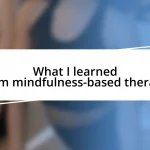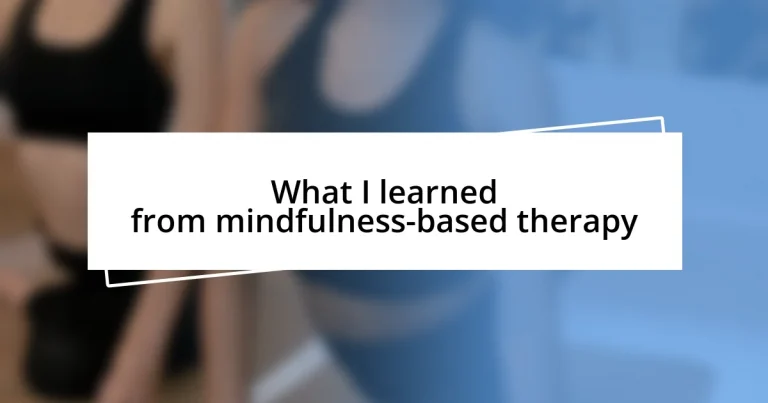Key takeaways:
- Mindfulness enhances emotional regulation and resilience, helping individuals manage anxiety and stress more effectively.
- Core principles of mindfulness include non-judgment, present-moment awareness, acceptance, curiosity, and self-compassion, which collectively enrich the practice.
- Long-term benefits of mindfulness include increased emotional resilience, improved focus, and stronger interpersonal connections, transforming daily experiences and relationships.
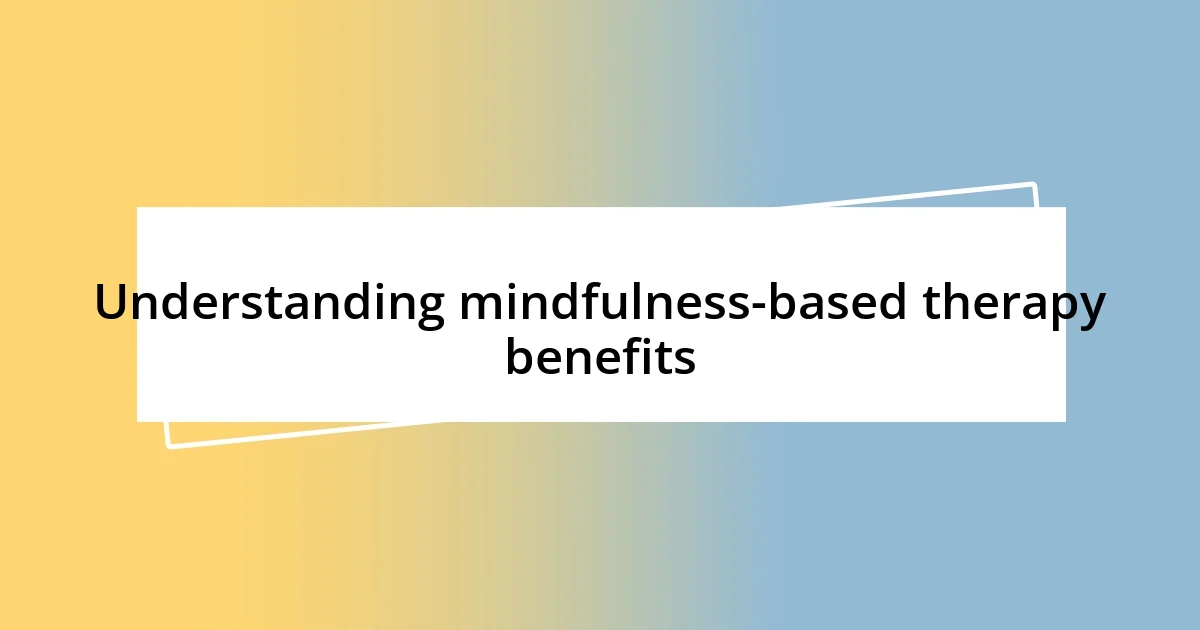
Understanding mindfulness-based therapy benefits
One of the most striking benefits of mindfulness-based therapy is its ability to enhance emotional regulation. I’ve experienced moments where simple breathing exercises helped me navigate overwhelming feelings—like when I felt a panic attack creeping in. Instead of succumbing to that wave of anxiety, I learned to pause and observe my emotions without judgment, which felt both liberating and powerful.
Moreover, mindfulness cultivates a deeper awareness of the present moment, leading to a greater appreciation for life’s little joys. I remember a time when I took a mindful walk through nature and noticed the vibrant colors of the leaves and the scent of fresh earth. It struck me how often I rush through life, missing these beautiful details, reinforcing the importance of staying grounded.
Additionally, I’ve found that mindfulness practices foster resilience against stress. There were challenging days when work demands felt like they were piling up, leading me to become overwhelmed. Practicing mindfulness helped me create a mental buffer that allowed me to face those pressures without losing my balance. Have you ever felt like stress was just too much? Mindfulness might be the key to reclaiming that inner calm.
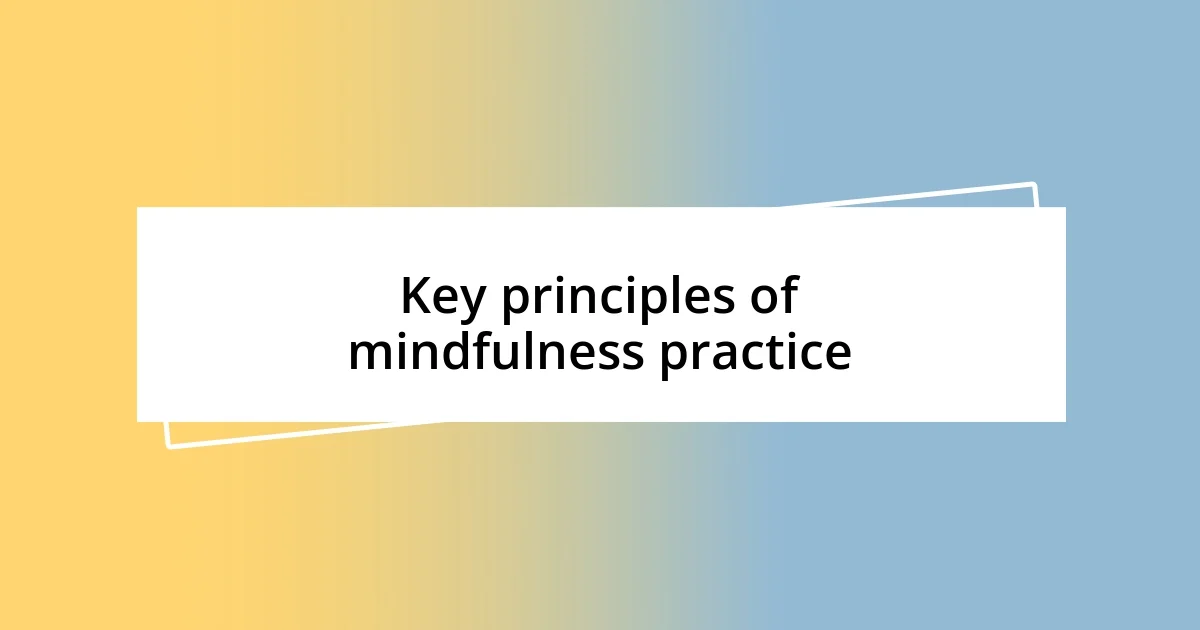
Key principles of mindfulness practice
Practicing mindfulness is centered on a few core principles that significantly enhance the experience. For me, one fundamental aspect is the act of non-judgment—learning to observe thoughts and feelings as they arise without labeling them as good or bad. There was a day when, during meditation, a wave of self-doubt flooded my mind. Instead of wrestling with it, I simply acknowledged it: “This is a thought, and it will pass.” This shift in perspective transformed my relationship with those intrusive thoughts, making them less daunting and more a part of my mental landscape.
Here are some key principles that form the foundation of mindfulness practice:
- Non-judgment: Accepting whatever arises in your mind without criticism helps create a safe space for exploration.
- Present-moment awareness: Focusing on the here and now cultivates a richer experience and helps reduce anxiety about the past or future.
- Acceptance: Embracing thoughts and feelings as they come without trying to change or control them can promote inner peace.
- Curiosity: Approaching experiences with an open mind fosters a sense of wonder and discovery, making each moment more meaningful.
- Self-compassion: Being kind to yourself during challenging moments not only nurtures emotional healing but also strengthens resilience.
Integrating these principles into daily practice has been transformative for me. Each time I return to them, I feel a sense of renewal and clarity. It’s an ongoing journey, and each step brings me deeper into the essence of mindfulness.
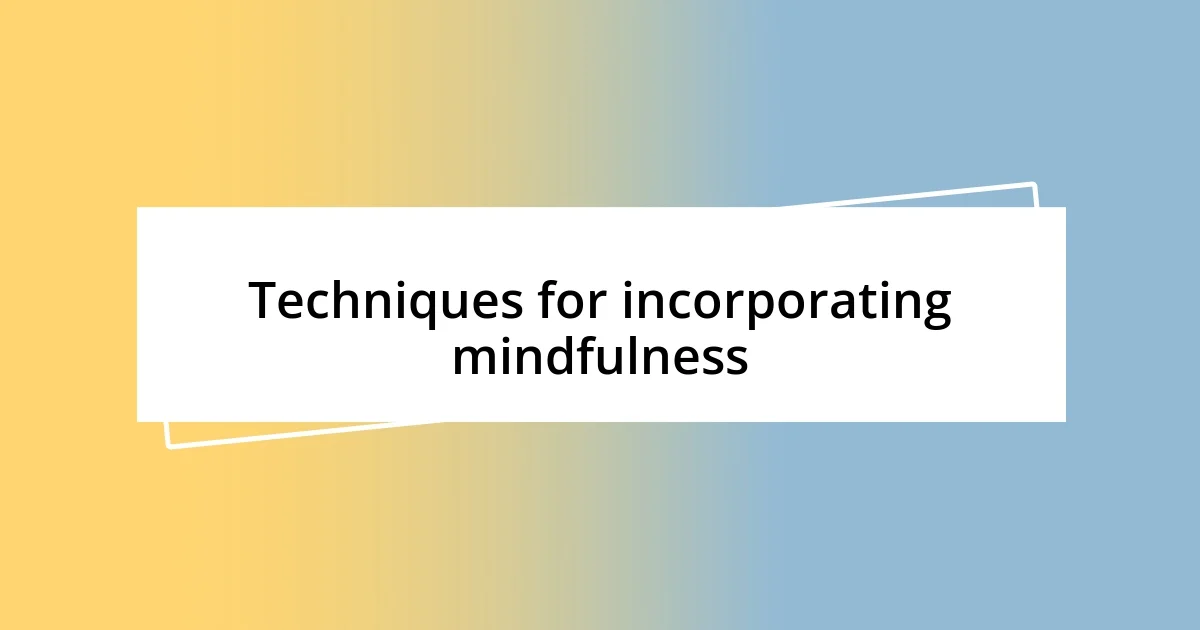
Techniques for incorporating mindfulness
To effectively incorporate mindfulness into your daily routine, simple yet impactful techniques can make a world of difference. One technique I’ve found particularly valuable is mindful breathing. When life gets chaotic, I take a moment to close my eyes and focus solely on my breath—feeling the air fill my lungs and the gentle rise and fall of my chest. This brief pause often grounds me, calming my racing thoughts and re-centering my focus.
Another practical method is the use of mindful eating. During meals, I try to eliminate distractions—no phone, no television. I focus on the flavors, textures, and even the colors of my food. I’ll never forget the day I savored each bite of a chocolate dessert. By being fully present, I appreciated the rich, velvety taste in a way I hadn’t before, transforming an ordinary treat into a profound experience.
Lastly, I find that integrating mini-mindfulness breaks throughout the day helps maintain a sense of serenity. For instance, during a hectic workday, I set a timer for five minutes to step away from my desk. In that time, I might stretch, listen to calming music, or simply reflect on my surroundings. This short ritual not only rejuvenates my spirit but also enhances my productivity, reminding me that a few moments of mindfulness can lead to a clearer, more creative mind.
| Technique | Description |
|---|---|
| Mindful Breathing | Focus on your breath to regain center and calm racing thoughts. |
| Mindful Eating | Eliminate distractions and savor each bite to enhance your appreciation of food. |
| Mini-Mindfulness Breaks | Take short breaks throughout the day to rejuvenate your spirit and enhance productivity. |
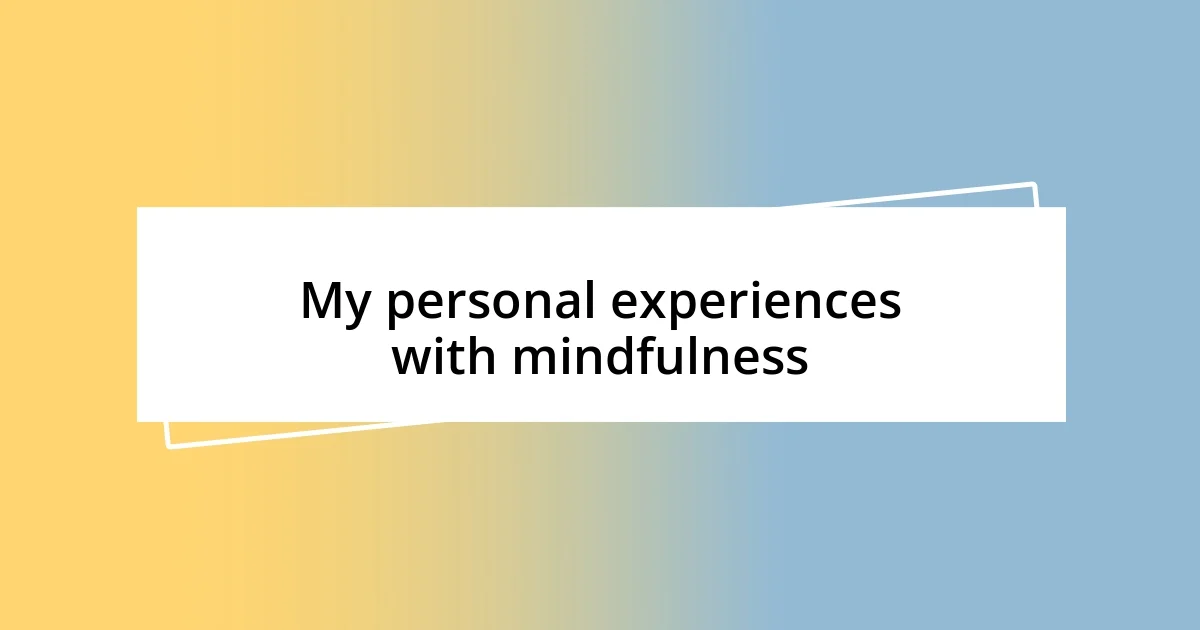
My personal experiences with mindfulness
My journey with mindfulness has been both enlightening and at times challenging. I recall one particular afternoon when I decided to try a short meditation session. As I sat in silence, I was surprised by the flood of thoughts that came rushing in—everything from the mundane tasks on my to-do list to remnants of past conversations. This made me wonder: why is it so hard to simply be present? Eventually, I understood that it was part of the process; acknowledging those thoughts without engaging with them became a lesson in itself.
I also experienced a profound moment during a walk in nature while practicing mindfulness. As I strolled through a park, I made a conscious choice to engage all my senses. I remember the warm sun on my skin, the rustle of leaves in the breeze, and the laughter of children nearby. In that moment, I felt an overwhelming connection to everything around me. It’s one thing to be present in your mind; it’s another to truly feel the world envelop you. Isn’t it fascinating how simply observing can transform an ordinary walk into a journey of self-discovery?
Through these experiences, I’ve learned that mindfulness isn’t just a practice—it’s a doorway to deeper emotions and revelations about myself. There are days when I forget to check in with my feelings. I’ll catch myself rushing through my morning routine. But when I pause to take a breath and ground myself, I can feel the shift in my mood, often replacing anxiety with a sense of calm. Have you noticed how a small act of mindfulness can change your whole day? It’s those moments of stillness that remind me of the richness life has to offer.
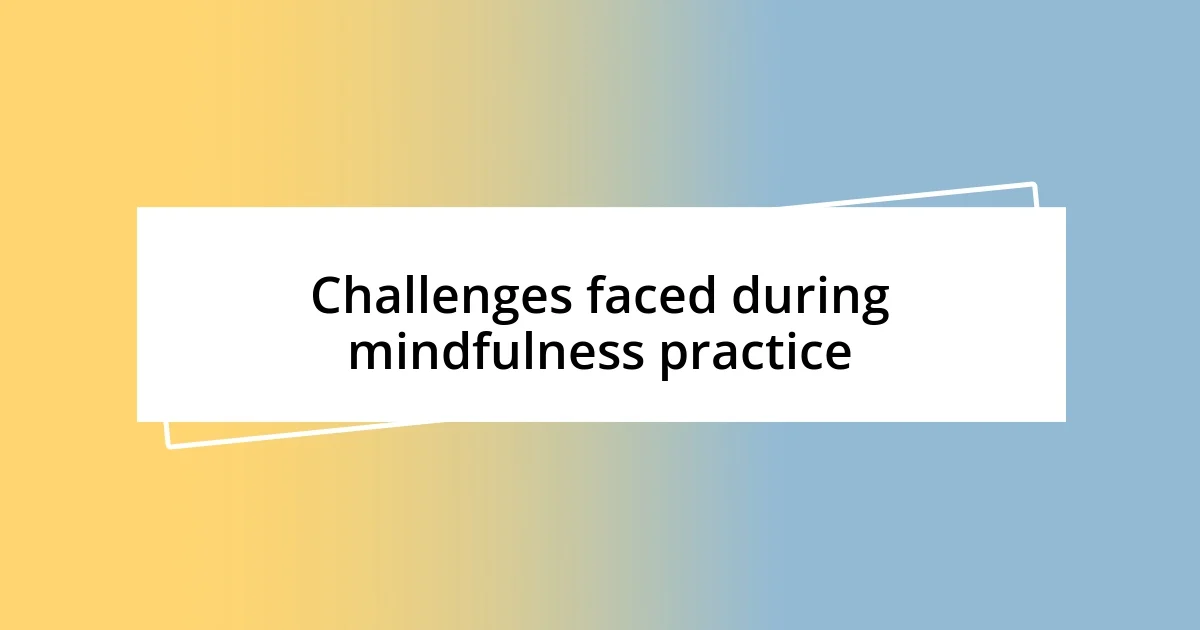
Challenges faced during mindfulness practice
When I first engaged in mindfulness practice, one challenge that stood out was dealing with restlessness. I vividly recall one evening, sitting cross-legged on my floor, and my mind was like a pinball machine—pinging from one thought to another. I remember feeling frustrated and asking myself, “Why can’t I just sit still?” It dawned on me that this restlessness is common; it’s our mind’s natural tendency to wander. Acknowledging it as part of the journey helped me embrace those moments instead of fighting against them.
Another hurdle I faced was the battle with self-judgment. During a meditation session, I caught myself critiquing my focus and wondering if I was ‘doing it right.’ It felt as if I was constantly grading my performance. This made me realize that mindfulness is not about perfection but about being present, imperfections and all. Have you ever found yourself in a similar position, feeling like you’re under scrutiny? Understanding that this judgment is part of my human experience allowed me to let go and simply experience the process of mindfulness.
Lastly, I discovered that integrating mindfulness into a busy lifestyle can be tricky. I thought I could magically create space in my packed schedule for meditation or mindful moments, but life often had other plans. One day, in a too-full week, I only managed to remember to breathe consciously while waiting in line at the grocery store. It struck me, though: even those brief moments can be transformative. Have you ever experienced a tiny moment become significant? Flipping the narrative about “not enough time” helped me discover that mindfulness doesn’t always require lengthy periods; it thrives in those quick, simple moments.
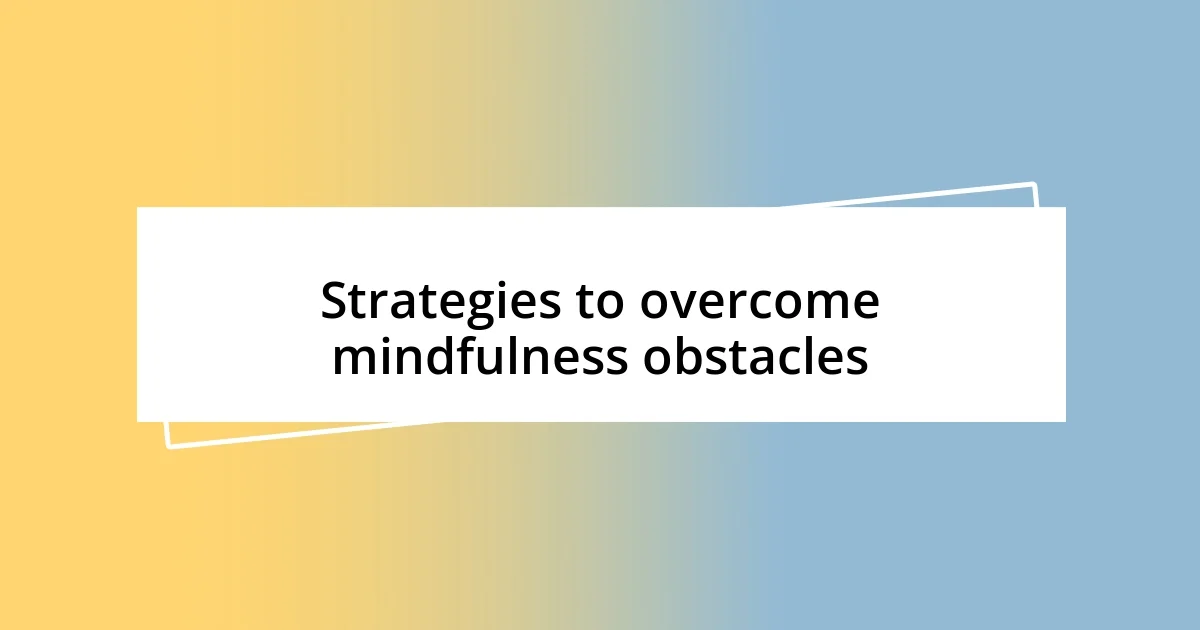
Strategies to overcome mindfulness obstacles
I’m often met with barriers when trying to embrace mindfulness, and breaking through those obstacles requires some creative strategies. One evening, feeling overwhelmed, I decided to change my environment—it was amazing how stepping outside for a few minutes shifted my perspective. Nature can be an incredible catalyst for mindfulness because it invites us to connect with our surroundings. Have you ever noticed how a change in scenery can pull you back to the present moment?
In my practice, I found that keeping it simple can be a game changer. For example, I started incorporating short mindful moments throughout my day instead of carving out a specific hour for meditation. While washing dishes, I focused entirely on the sensations—the warm water, the soap’s scent. It was as if I had transformed a mundane task into a moment of deep awareness. How can you integrate mindfulness into activities you already do?
Of course, some days are tougher than others, and the urge to skip my practice can be strong. On particularly chaotic mornings, I found it helpful to set a timer for just three minutes. This small commitment felt manageable and often blossomed into longer sessions. Have you ever experienced that feeling of resistance just before starting something good? It was a revelation to realize that even a brief pause could reconnect me with my breath and center my thoughts, allowing me to tackle the day with renewed energy.
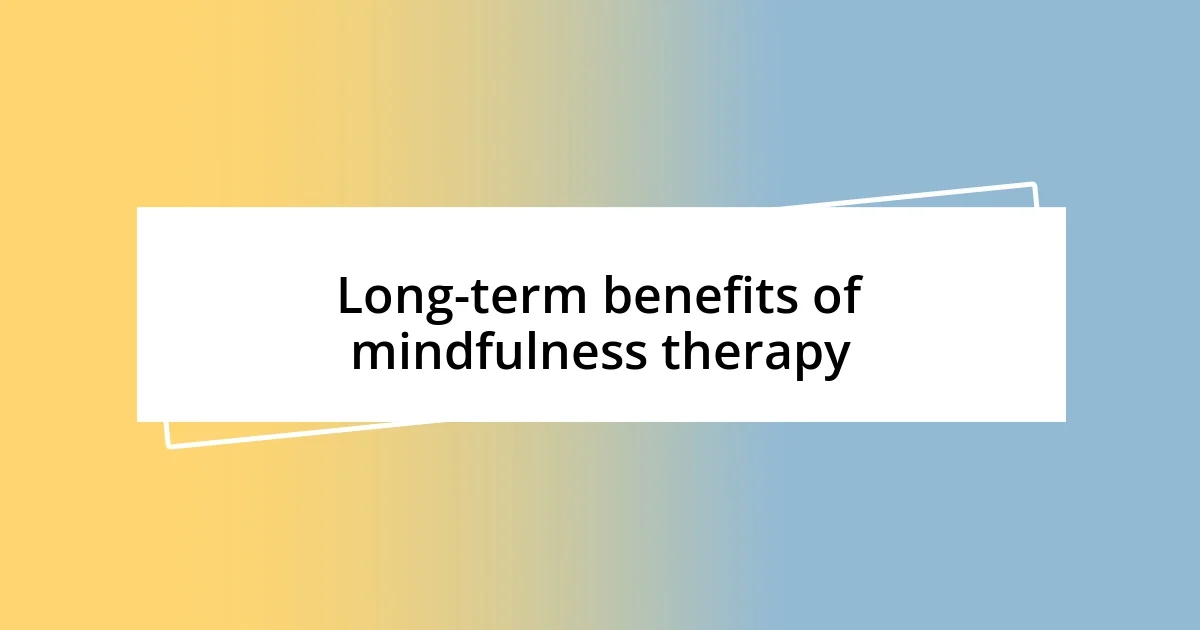
Long-term benefits of mindfulness therapy
One of the profound long-term benefits I’ve noticed from mindfulness therapy is an increased sense of emotional resilience. Before delving into mindfulness, I often found myself swept away by my emotions, feeling like a leaf carried by the wind. But now, I recognize my emotions as temporary visitors rather than permanent residents. This shift has empowered me to respond to challenging situations with much more clarity and composure. Have you ever felt that surge of emotion overwhelm you? Embracing mindfulness allows us to create a buffer against those intense feelings, making it easier to regain our balance.
Another significant gain from my mindfulness journey has been improved focus and concentration. I recall struggling to finish a book or even a single task without my mind wandering off. Now, I often immerse myself in activities with a sense of flow that was previously elusive. Mindfulness practice honed my ability to sustain attention, which has been incredibly valuable in both work and leisure situations. Do you find it challenging to stay present in your tasks? This enhanced focus makes even mundane tasks feel more engaging and fulfilling, transforming the way I experience everyday life.
I’d be remiss not to mention the deeper connections I’ve forged in my relationships since embracing mindfulness. Reflecting on one particular conversation, I remember being able to really listen to a friend without planning my response halfway through. That moment of genuine connection filled me with warmth and understanding. Mindfulness fosters empathy and presence, allowing us to connect with others in a more meaningful way. Have you felt a disconnect in your conversations lately? By being fully present, I’ve found that my interactions are not just exchanges of words but opportunities for shared understanding.





